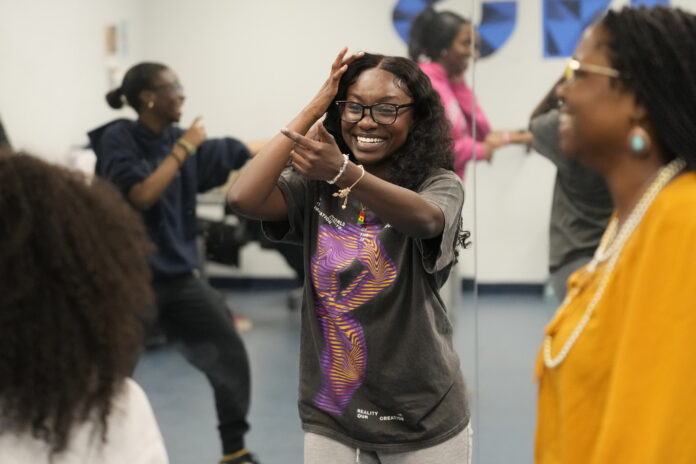
CHICAGO (AP) — When she started writing her college essay, Hillary Amofa told the story she thought admissions offices wanted to hear. About being the daughter of immigrants from Ghana and growing up in a small apartment in Chicago. About hardship and struggle.
Then she deleted it all.
“I would just find myself kind of trauma-dumping,” said the 18-year-old senior at Lincoln Park High School in Chicago. “And I’m just like, this doesn’t really say anything about me as a person.”
When the Supreme Court ended affirmative action in higher education, it left the college essay as one of few places where race can play a role in admissions decisions. For many students of color, instantly more was riding on the already high-stakes writing assignment. Some say they felt pressure to exploit their hardships as they competed for a spot on campus.
Amofa was just starting to think about her essay when the court issued its decision, and it left her with a wave of questions. Could she still write about her race? Could she be penalized for it? She wanted to tell colleges about her heritage but she didn’t want to be defined by it.
In English class, Amofa and her classmates read sample essays that all seemed to focus on some trauma or hardship. It left her with the impression she had to write about her life’s hardest moments to show how far she’d come. But she and some classmates wondered if their lives had been hard enough to catch the attention of admissions offices.
This year’s senior class is the first in decades to navigate college admissions without affirmative action. The Supreme Court upheld the practice in decisions going back to the 1970s, but this court’s conservative supermajority found it is unconstitutional for colleges to give students extra weight because of their race alone.
Still, the decision left room for race to play an indirect role: Chief Justice John Roberts wrote universities can still consider how an applicant’s life was shaped by their race, “so long as that discussion is concretely tied to a quality of character or unique ability.”
Scores of colleges responded with new essay prompts asking about students’ backgrounds.
When Darrian Merritt started writing his essay, his first instinct was to write about events that led to him going to live with his grandmother as a child. Those were painful memories, but he thought they might play well at schools like Yale, Stanford and Vanderbilt.
“I feel like the admissions committee might expect a sob story or a tragic story,” said Merritt, a senior in Cleveland. “I wrestled with that a lot.”
Eventually he abandoned the idea and aimed for an essay that would stand out for its positivity.
Merritt wrote about a summer camp where he started to feel more comfortable in his own skin. He described embracing his personality and defying his tendency to please others. But the essay also reflects on his feelings of not being “Black enough” and getting made fun of for listening to “white people music.”
Like many students, Max Decker of Portland, Oregon, had drafted a college essay on one topic, only to change direction after the Supreme Court ruling in June.

Decker initially wrote about his love for video games. In a childhood surrounded by constant change, navigating his parents’ divorce, the games he took from place to place on his Nintendo DS were a source of comfort.
But the essay he submitted to colleges focused on the community he found through Word is Bond, a leadership group for young Black men in Portland.
As the only biracial, Jewish kid with divorced parents in a predominantly white, Christian community, Decker wrote he felt like the odd one out. On a trip with Word is Bond to Capitol Hill, he and friends who looked just like him shook hands with lawmakers. The experience, he wrote, changed how he saw himself.
“It’s because I’m different that I provide something precious to the world, not the other way around,” wrote Decker, whose top college choice is Tulane, in New Orleans, because of the region’s diversity.
Amofa used to think affirmative action was only a factor at schools like Harvard and Yale. After the court’s ruling, she was surprised to find that race was taken into account even at public universities she was applying to.
Now, without affirmative action, she wondered if mostly white schools will become even whiter.
It’s been on her mind as she chooses between Indiana University and the University of Dayton, both of which have relatively few Black students. When she was one of the only Black students in her grade school, she could fall back on her family and Ghanaian friends at church. At college, she worries about loneliness.
“That’s what I’m nervous about,” she said. “Going and just feeling so isolated, even though I’m constantly around people.”
The first drafts of her essay didn’t tell colleges about who she is now, she said.
Her final essay describes how she came to embrace her natural hair. She wrote about going to a mostly white grade school where classmates made jokes about her afro.
Over time, she ignored their insults and found beauty in the styles worn by women in her life. She now runs a business doing braids and other hairstyles in her neighborhood.
“Criticism will persist,” she wrote “but it loses its power when you know there’s a crown on your head!”


